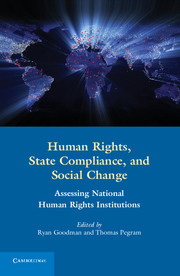Book contents
13 - National Human Rights Institutions, Opportunities, and Activism
from PART IV - Final Reflections
Published online by Cambridge University Press: 05 June 2012
Summary
Introduction
Protecting and promoting human rights has been a historical give and take. Activists at the grass roots have worked courageously to expose violations of human rights, attempting to enlist more powerful authorities to pressure or punish violators. They have used the tools of social movements, including protests and demonstrations, in attempts to mobilize an audience into action. A wide range of institutions, including national institutions, as well as supranational bodies and transnational organizations, have articulated universalistic standards of human rights and publicized the work of activists, calling for states to protect human rights. Nothing happens easily, as effective enforcement of human rights generally involves more powerful actors intervening to alter the balance of power within a state. Both activists and authorities seek to move beyond ad hoc enforcement of human rights, establishing a permanent presence to keep human rights in view. What are we to make of the establishment of new institutions at the national level specifically charged with the protection of human rights? How do these national human rights institutions (NHRIs) influence the ongoing campaigns to advance the cause?
The chapters in this volume emphasize the limitations of NHRIs. It is difficult to get states to create institutions that are independent enough and sufficiently powerful to provide meaningful redress, particularly when the national bodies that create human rights institutions are often also culpable in the violation of human rights. Even institutions that comply with ideal organizational structures (in theory) suffer from political interference, inadequate funding, and leadership failures. Indeed, the intense attention to the need for exceptional leadership undermines the notion that establishing NHRIs can, in itself, address ongoing concerns about human rights.
- Type
- Chapter
- Information
- Human Rights, State Compliance, and Social ChangeAssessing National Human Rights Institutions, pp. 324 - 334Publisher: Cambridge University PressPrint publication year: 2011



